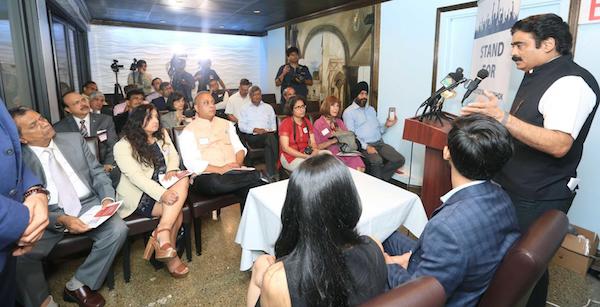
SAN FRANCISCO (TIP): Shailesh Prakash, an Indian American Google News executive picked to super charge the search giant’s news efforts, has reportedly resigned amid rising tensions with publishers accusing it of siphoning critical advertising revenue.
Prakash had served as a vice president and general manager for Google News. New York Post cited an unnamed source as confirming that he is no longer with the company.
It was first reported on his resignation, citing people familiar with the matter. The circumstances behind Prakash’s resignation were not immediately clear. Google declined to comment on the Post.
Prakash’s job experience gave him unique insight into the news industry’s gripes with Google. He joined Google in Nov. 2022 after an 11-year stint at the Washington Post, where he served as chief product and technology officer, according to his LinkedIn profile.
He was credited with guiding the newspaper’s shift toward digital content during that period, including its creation of an in-house advertising technology business, the Journal said.
Prakash reportedly worked closely with billionaire Jeff Bezos after the Amazon founder bought the Washington Post for $500 million in 2013. The outgoing Google executive previously held roles at Sun Microsystems, Motorola, Netscape, Microsoft, and Sears Holdings, showcasing a wealth of experience in both technology and corporate strategy.
Google has faced intense scrutiny in recent months over its business practices and the alleged harm they have caused to news publishers, which rely on the search giant for the site traffic that underpins ad sales, the Post noted.
The tech giant rankled online publishers last May after it introduced a feature called “AI Overviews” – which places an auto-generated summary at the top of its search results while burying links to other sites, according to the post.
News Media Alliance, a nonprofit that represents more than 2,200 publishers, said the feature would be “catastrophic to our traffic” and has called on the feds to intervene.
Critics allege that Google used publishers’ copyrighted content to “train” its artificial intelligence tools without proper credit or attribution. Google is also accused of dodging legislative efforts aimed at making tech firms pay their fair share.
The stakes are particularly high in India, where publishers have voiced strong objections to Google’s practices, Campaign India reported. Represented by bodies like the Digital News Publishers Association (DNPA) and the News Broadcasters & Digital Association (NBDA), they assert that the tech giant’s control over ad revenue distribution marginalizes their share, affecting the sustainability of news operations.
This is especially significant in India, where an estimated 55% of news website traffic comes through Google, according to data presented to the Competition Commission of India (CCI).
Central to the publishers’ grievances is the rise in ‘zero-click searches’, a phenomenon where Google’s snippets or summaries satisfy users’ queries on the search result page itself, meaning users do not click through to publishers’ websites.
Consequently, it benefits by retaining traffic and displaying its own ads, while publishers miss out on potential revenue. Adding to their concerns, publishers also lack access to Google’s data on the revenue generated through these searches, making it harder to advocate for a fairer distribution model.
In January 2022, after receiving multiple complaints from publishing associations, the CCI launched an investigation into Google’s dominance over digital advertising and its alleged revenue practices.
The case has since been a closely watched development, expected to define whether Google has abused its market position and, more significantly, whether it should pay publishers for using snippets from their content in search results.





Be the first to comment